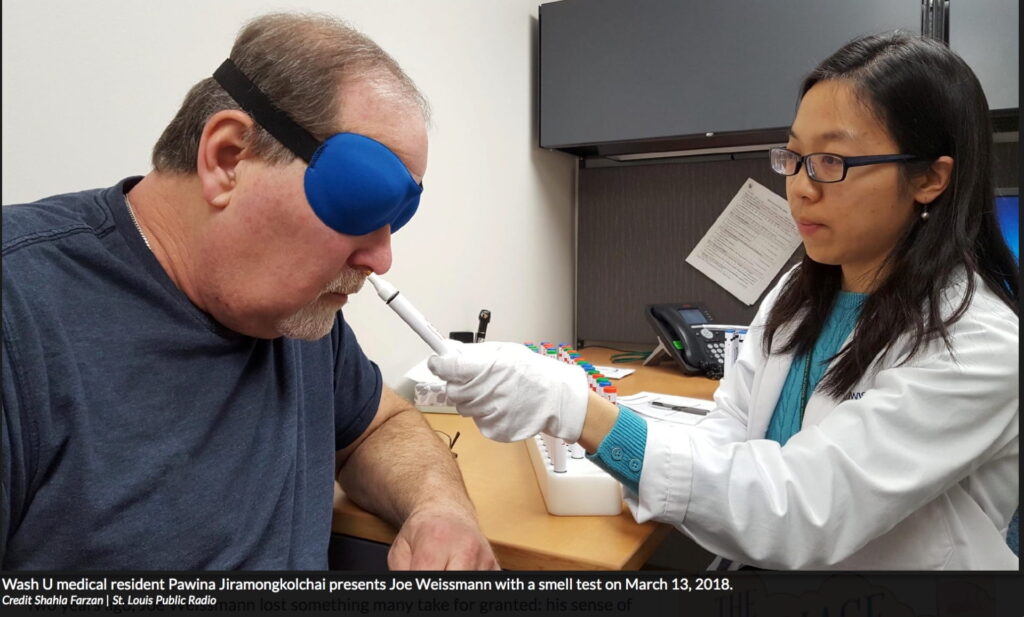With a sharp uptick in COVID-19 cases throughout the country, hospitals are seeing a steady increase in patients who have lost their sense of smell and taste.
Anosmia is the temporary or permanent loss of the ability to detect one or more smells. Without the sense of smell, patients are unable to distinguish the differences in food or flowers, for example. They also become unable to detect toxic odors and chemicals.
Dysgeusia is the loss of sense of taste. Some people can develop parosmia, which is a distortion in the sense of smell.
Patients who have a sudden loss of either their sense of taste or smell should suspect COVID-19 and take the precautionary steps indicated by their healthcare professional, according to Jay Piccirillo, MD.

Some people are more likely to have problems with their sense of taste or smell than others, says Piccirillo. People at risk for loss of sense of smell, include those who have:
- Use of tobacco products
- Dental or nasal problems
- Head injuries
- Conditions such as Alzheimer’s or Parkinson’s disease
- Exposure to some medications and cancer treatments
How are Washington University otolaryngologists helping and advising COVID-19 patients with anosmia? Piccirillo reveals the answers.
Are you seeing many patients with anosmia?
Yes, and unfortunately, we are expecting more as the COVID-19 pandemic continues.
If a patient has anosmia because of COVID-19, how long does it usually last?
For approximately 95 percent of people, the anosmia lasts 2-3 weeks.
Is there a chance the sense of smell could never come back?
Absolutely. Fortunately, for the vast majority (95 percent), sense of smell returns within a few weeks.
Is there ongoing research about this within WashU?
Yes, we are conducting a study right now on the clinical course of smell recovery after COVID. In addition, we will be starting several treatment trials.
How do you treat (if at all) patients who present with anosmia?
Olfactory training, oral steroids, nasal saline lavage with steroids.
How effective is it?
It is too early in the pandemic to say with certainty how effective these treatments are. We do believe that starting treatment as early as possible is most likely to be helpful.
Why is the sense of smell so important?
Sense of smell is important for defense and protection (i.e., smell of fire, gas, rancid food). Sense of smell also helps with identifying food, and processing emotions and memory.
What percentage of COVID patients have anosmia?
It is estimated that between 40 and 60 percent of COVID patients experience anosmia during the acute or initial presentation of COVID. Of them, about 5 percent have persistent anosmia after three months.
What percentage of the population had anosmia pre-COVID?
Nearly 1 in 4 Americans (or 23 percent) over the age of 40 report some alteration in their sense of smell. Approximately 3 percent of Americans have anosmia (no sense of smell) or severe hyposmia (minimal sense of smell).
What research is ongoing at WashU right now regarding anosmia, COVID-related or not?
- Clinical trajectory of smell loss and recovery after COVID
- Intranasal theophylline for treatment of anosmia.
- Visual and olfactory training for anosmia
- Development of a simple home test of anosmia
- Modeling the next wave of COVID and the coming deluge of COVID-associated anosmia
- Olfactory dysfunction in pre-clinical Alzheimer’s disease
In what other situations do people get anosmia?
Other rhinoviruses, allergies, nasal polyps, nasal trauma. In some cases, they are born without sense of smell.
